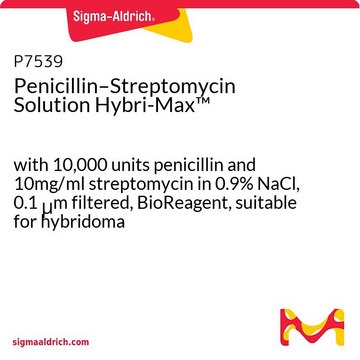G1146
ʟ-Glutamine–Penicillin–Streptomycin
solution, suitable for cell culture, BioReagent
Synonyme(s) :
Pen/Strep, Penicillin/Streptomycin
About This Item
Produits recommandés
Nom du produit
L-Glutamine–Penicillin–Streptomycin solution, with 200 mM L-glutamine, 10,000 U penicillin and 10 mg steptomycin/mL in 0.9% NaCl, 0.1 μm filtered, BioReagent, suitable for cell culture
Source biologique
synthetic
Niveau de qualité
Stérilité
0.1 μm filtered
Gamme de produits
BioReagent
Forme
liquid
Technique(s)
cell culture | mammalian: suitable
Impuretés
endotoxin, tested
Spectre d'activité de l'antibiotique
Gram-negative bacteria
Gram-positive bacteria
Mode d’action
cell wall synthesis | interferes
protein synthesis | interferes
Conditions d'expédition
dry ice
Température de stockage
−20°C
Vous recherchez des produits similaires ? Visite Guide de comparaison des produits
Catégories apparentées
Application
Actions biochimiques/physiologiques
Antimicrobial spectrum: Gram-negative and Gram-positive bacteria.
Composants
Vous ne trouvez pas le bon produit ?
Essayez notre Outil de sélection de produits.
Mention d'avertissement
Danger
Mentions de danger
Conseils de prudence
Classification des risques
Resp. Sens. 1 - Skin Sens. 1
Code de la classe de stockage
10 - Combustible liquids
Classe de danger pour l'eau (WGK)
WGK 3
Point d'éclair (°F)
Not applicable
Point d'éclair (°C)
Not applicable
Faites votre choix parmi les versions les plus récentes :
Déjà en possession de ce produit ?
Retrouvez la documentation relative aux produits que vous avez récemment achetés dans la Bibliothèque de documents.
Les clients ont également consulté
Articles
Importance and uses of glutamine in hybridoma and mammalian cell culture
Notre équipe de scientifiques dispose d'une expérience dans tous les secteurs de la recherche, notamment en sciences de la vie, science des matériaux, synthèse chimique, chromatographie, analyse et dans de nombreux autres domaines..
Contacter notre Service technique











